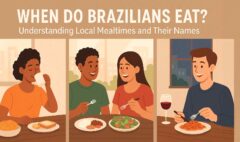Comprehensive Guide to Portuguese Verb Conjugation
Comprehensive Guide to Portuguese Verb Conjugation
Mastering Portuguese verb conjugation is essential for anyone learning the language. Portuguese, like other Romance languages, has a complex conjugation system influenced by tense, mood, and subject pronouns. In this article, we will break down Portuguese verbs in a structured and easy-to-understand manner to help learners gain confidence in using them correctly.
Understanding Portuguese Verbs
Verb Groups in Portuguese
Portuguese verbs are categorized into three groups based on their infinitive endings:
- First Group: Verbs ending in -ar (e.g., falar – to speak)
- Second Group: Verbs ending in -er (e.g., comer – to eat)
- Third Group: Verbs ending in -ir (e.g., partir – to leave)
Each of these groups follows a distinct conjugation pattern across various tenses.
Portuguese Verb Conjugation in Different Tenses
1. Present Tense (Presente do Indicativo)
The present tense is used to describe actions happening right now or habitual actions.
| Subject | Falar (To Speak) | Comer (To Eat) | Partir (To Leave) |
|---|---|---|---|
| Eu (I) | falo | como | parto |
| Tu (You) | falas | comes | partes |
| Ele/Ela/Você (He/She/You formal) | fala | come | parte |
| Nós (We) | falamos | comemos | partimos |
| Vós (You all) | falais | comeis | partis |
| Eles/Elas/Vocês (They/You all formal) | falam | comem | partem |
2. Past Tenses
Portuguese has multiple past tenses, each serving a distinct purpose.
Preterite (Pretérito Perfeito Simples)
Used for actions completed in the past at a specific time.
| Subject | Falar | Comer | Partir |
| Eu | falei | comi | parti |
| Tu | falaste | comeste | partiste |
| Ele/Ela/Você | falou | comeu | partiu |
| Nós | falamos | comemos | partimos |
| Vós | falastes | comestes | partistes |
| Eles/Elas/Vocês | falaram | comeram | partiram |
Imperfect (Pretérito Imperfeito)
Describes habitual past actions or ongoing past events.
| Subject | Falar | Comer | Partir |
| Eu | falava | comia | partia |
| Tu | falavas | comias | partias |
| Ele/Ela/Você | falava | comia | partia |
| Nós | falávamos | comíamos | partíamos |
| Vós | faláveis | comíeis | partíeis |
| Eles/Elas/Vocês | falavam | comiam | partiam |
3. Future Tense (Futuro do Indicativo)
Used for actions that will happen in the future.
| Subject | Falar | Comer | Partir |
| Eu | falarei | comerei | partirei |
| Tu | falarás | comerás | partirás |
| Ele/Ela/Você | falará | comerá | partirá |
| Nós | falaremos | comeremos | partiremos |
| Vós | falareis | comereis | partireis |
| Eles/Elas/Vocês | falarão | comerão | partirão |
Common Irregular Verbs in Portuguese
Some verbs do not follow regular conjugation patterns. Here are some of the most common irregular verbs:
Ser (To Be) – Present Tense
| Subject | Ser |
| Eu | sou |
| Tu | és |
| Ele/Ela/Você | é |
| Nós | somos |
| Vós | sois |
| Eles/Elas/Vocês | são |
Ter (To Have) – Present Tense
| Subject | Ter |
| Eu | tenho |
| Tu | tens |
| Ele/Ela/Você | tem |
| Nós | temos |
| Vós | tendes |
| Eles/Elas/Vocês | têm |
Subjunctive Mood (Modo Subjuntivo)
The subjunctive mood is used to express doubt, wishes, or hypothetical situations.
Present Subjunctive (Presente do Subjuntivo)
Formed from the first-person singular (eu) form of the verb in the present indicative, dropping the final -o, and adding subjunctive endings.
| Subject | Falar | Comer | Partir |
| Eu | fale | coma | parta |
| Tu | fales | comas | partas |
| Ele/Ela/Você | fale | coma | parta |
| Nós | falemos | comamos | partamos |
| Vós | faleis | comais | partais |
| Eles/Elas/Vocês | falem | comam | partam |
Imperative Mood (Modo Imperativo)
Used for giving commands or instructions.
Affirmative Commands
| Subject | Falar | Comer | Partir |
| Tu | fala | come | parte |
| Você | fale | coma | parta |
| Nós | falemos | comamos | partamos |
| Vocês | falem | comam | partam |
Conclusion
Understanding Portuguese verb conjugation is crucial for fluency in the language. By mastering regular and irregular verb patterns, learners can confidently express themselves in various tenses and moods. Practice and exposure to native Portuguese content will enhance retention and application of these conjugations.
Learn Portuguese the Brazilian Way! 🇧🇷✨
At The Brazilian Ways, we believe language learning should be fun, immersive, and deeply connected to culture. Our unique courses help you speak Portuguese naturally while experiencing Brazil through its music, films, literature, and dance.
🎶 The Brazilian Music Club – Learn Portuguese through the rhythm and lyrics of Brazilian music.
🎬 The Movie Club – Improve your Portuguese while exploring the best of Brazilian cinema.
📖 The Short Story Club – Enhance your skills by diving into Brazilian literature.
💃 Portuguese for Zouk – Connect with the Zouk dance community while learning Portuguese.
✨ Join a vibrant community of learners and experience Brazil through language!
👉 Explore our programs and start today! 🚀
📲 Follow us on Instagram for more engaging content, language tips, and cultural insights: @thebrazilianways













